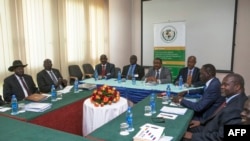With less than 12 hours to go, South Sudan’s warring factions are still not any closer to signing a comprehensive peace deal that will avoid United Nations sanctions.
"Little to no progress" has been the main descriptor of successive rounds of talks to mediate an end to fighting that began as a political dispute between South Sudan’s president and his former deputy in December 2013.
The parties came together again in late February in Addis Ababa for last-minute negotiations. Two days of closed door face-to-face-talks been President Salva Kiir and rebel leader Riek Machar only brought the men physically closer while they remained worlds apart on how to achieve peace.
Even increased international pressure had no immediate impact when the U.N. Security Council Tuesday passed a resolution to impose sanctions in the absence of a detailed power-sharing agreement.
Gideon Mabor, a civil society representative to the peace process, says it is time for new delegations because both sides have failed and both share the blame.
“Both parties are playing a game of tactic role just to buy time," said Mabor. "There is a belief by the opposition that if they will buy time, then the legitimacy of the government will run out, which is a very cheap idea. While the government is not moving the extra mile to realize peace.”
Security arrangements have always been the main point of contention - with the opposition rejecting an immediate reintegration of rebel soldiers back into the armed forces. They want more time for trust building between the soldiers. And then there is the structure of the government, specifically whether or not a vice-president with executive powers will be installed. The two parties also haven’t agreed yet on the principles of implementing federalism in South Sudan.
IGAD, the regional mediation body, has only been able to induce repeated ceasefires - which have been quickly ignored.
Alex Rondos, the European Union Special Envoy for the Horn of Africa, says it may be time to add some outside muscle to IGAD.
“But it will be complemented and supplemented by other actors in the international community," Rondos said. "I suspect other African heads of state and other members of the international community will unite in order to make sure that there is framework to be able to continue to arrive not only at a short term solution to bring peace, but to work through the longer term issues of establishing a country that is sustainable and viable.”
The looming U.N. sanctions might not be limited to travel bans and assets freezes for individuals believed to be obstructing the process. Without a real deal, sanctions might also include an arms embargo.
Solomom Dersso, an analyst with the Institute for Security Studies, believes sanctions, without a political strategy, do not create the right incentive for those in the negotiating process.
“What should have happened, is basically for countries in the region and in the international community to have a united political strategy, with no opening left for these two sides to manipulate, that hasn’t happened. And that’s why they were able to create alternative forums like the Arusha talks. Which enabled them to play one forum against the other,” said Dersso.
A political rift led to a military split and the ensuing fighting has killed tens of thousands of people, displaced nearly two million and left another 4 million people dependent on food assistance.







